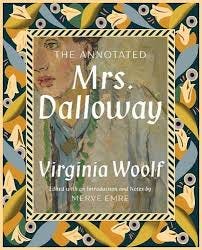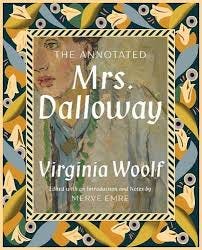One of my killjoy survival tips in The Feminist Killjoy Handbook is to listen to the feminist killjoy as if she is another person.
Once we have heard something of our own history in the figure of the feminist killjoy (or another kind of killjoy), it is too easy (also wrong) to assume that is who we always are. The killjoy comes before us and remains exterior to us. So, when the killjoy arrives, it can be unexpected.
The killjoy can arrive as another person. Or as a thought. Or in an overheard conversation. Our own joy can be killed because of what is brought into the room. Or to the party.
A killjoy as a party pooper.
I dreamt of Virginia Woolf’s Mrs. Dalloway the other day. It was an anxiety dream. I was on a panel to discuss Mrs. Dalloway. I had forgotten my script.
I had no words.
So, I went back to the words.
Yes, I met you again, Clarissa, watching yourself becoming Mrs. Dalloway, disappearing like that.
And I met Septimus again. Septimus, suffering from shell shock, for whom the war does not stop intruding into the present; a shattering.
Clarissa and Septimus do not meet.
But they achieve an odd intimacy.
Sadness can be intimacy. Sad in their own way; histories kept alive as they pass each other on the street.
If the histories are not shared, something is.
Clarissa thinks of the “odd infinities” she has with those “she had never spoken to,” sitting on the bus.
But this is Mrs. Dalloway.
And as you probably know, Clarissa is having a party.
So, it is a busy day.
It is because Clarissa is planning a party, that we don’t learn very much about her sadness. She recalls lost intimacies, with Peter and Sally, who both turn up, unexpectedly during the day, as if bearing some relation to Mrs. Dalloway’s own thoughts, “she had been thinking of Bourton, of Peter, of Sally.” Such lost intimacies become lost possibilities, hints of a life Clarissa might have lived if she hadn’t become Mrs. Dalloway.
I call this a killjoy truth.
To become conscious of possibility can involve mourning its loss.
But then the party happens. And then Septimus arrives. Not himself. Not even close.
It is at the party that Mrs. Dalloway hears of Septimus’s death.
Lady Bradshaw said, “‘Just as we were starting, my husband was called up on the telephone, a very sad case. A young man (that is what Sir William is telling Mr. Dalloway) had killed himself. He had been in the army.’ Oh! Thought Clarissa, in the middle of my party, here’s death, she thought.”
In the middle of her party, Septimus turns up, or word of him; the violence of his death, the violence that led to his death.
What happens when you break a seal? What is let in? Who is let in?
Clarissa has her own question.
She asks, “What business had the Bradshaws to talk of death at her party?”
She observes, “A young man had killed himself.”
“And they talked of it at her party – the Bradshaws talked off death. He had killed himself– but how?”
Violence has entered the room.
And then: her body goes through it.
“Always her body went through it first, when she was told, suddenly, of an accident; her dress flamed, her body burnt. He had thrown himself from a window. Up had flashed the ground; through him, blundering, bruising, went the rusty spikes. There he lay with the thud, thud, thud in his brain, and then a suffocation of blackness. So she saw it. But why had he done it? And the Bradshaws talked of it at her party!”
His death becomes a question that takes Mrs. Dalloway away from the party; she attends to his death, wonders about it; she becomes a retrospective witness even though she was not and could not have been there.
The shudder: the sounds of it.
The thud, thud, thud of it
The ground that flashes
The rusty spikes.
The killjoy enters not as a person.
But in a conversation.
Others speak of it.
Talked of him,
what happened to him
At her party.
Death comes into the room.
War also.
The cost of it. The sound of it.
The trauma in it.
And in that moment, life becomes chatter, what comes and goes.
“They went on living,” “people kept on coming.”
It is the suffering of an intruder that exposes the emptiness of life’s chatter.
Someone not invited into the room.
Suffering enters not as self-consciousness but world-consciousness in which the suffering of those assumed not to belong disturbs an atmosphere.
Is that the consciousness we need?
Even when unhappiness is a familiar feeling, it can arrive like a stranger, to disturb the familiar.
If I lost the words, they came to me for a reason.
To help me see something or to say it.
How much violence do they want us not to mention so they can have their party?
How much are we not allowed to say so their bodies do not have to go through it?
To speak of genocide: to interrupt the conversation, the events, the proceedings.
Really? Yes, really.
"Let us not use the church for a place of political statement."
Said Father Mathews
After protestors highlighted “the silence of the Catholic church on the genocide in Palestine.”
Said Kamala Harris
After protestors chanted “Kamala, Kamala, you can’t hide, we won’t vote for genocide.”
“You know what? If you want Donald Trump to win, then say that. Otherwise, I’m speaking.”
How much violence are we not to speak of so you can finish your speech?
“Change through power not process”.
Said David Lammy
Who kept saying these words
the same words
in response to protestors who shouted,
"Will you condemn the genocide?" and "how many more children need to die?"
This is not the time for polite words
Said because they do nothing
More empty chatter
So they kept shouting
Until they were dragged out
And he went back to speaking
The killjoy is an interruption.
Or the cause of one.
Coming up when the violence travels into the room.
Or telling us of the violence that is already in the room.
Because the room is in the world.
That’s why we are willing to receive it,
the killjoy assignment, that is.
Received because of what they refuse to hear.
We will keep interrupting, speaking, shouting
Stopping you from speaking, even
if glossing over it
is what you say or do.
Another Killjoy Truth
Silence about Violence is Violence
Every truth leading to
#FreePalestine





Thank you for giving me some things to think about. As someone who reminds 'polite company' at this time of year of the persecution, death and destruction borne by the Palestinians, I think I will revisit Mrs Dalloway. I'm yet another feminist killjoy. So many of us. I wonder why...
Free Palestine!